It may surprise you how much variety a bunnies diet can have. While their staple foods are hay and leafy greens, there are many vegetable options that can be used to enhance the flavors of your bunny’s salad.
There are also a variety of fruits your bunny can eat as treats as well as other human foods that are bunny safe which is good to know in case your bunny takes a dive into your popcorn bowl!
Remember to introduce any new foods one at a time in small quantities and monitor your bunny to see if your bunny’s stomach can handle the new food. Before we dive into which foods your bunny can eat, here is a table showcasing some of the more common nutrients and their benefits for bunnies.
| Fiber | Helps keep their gut moving to avoid GI stasis [2]. |
| Calcium | Great for bone health, but not great in excess as can lead to poor tooth and bone health [2]. |
| Phosphorus | Good for bone development in combination with calcium [3]. |
| Potassium & Magnesium | Electrolytes for overall health and regulation of the nervous system. |
| Vitamin A | Necessary for vision, bone development, and the immune system [2]. |
| Vitamin D | Helps bone and teeth health by working enhancing calcium and phosphorus absorption [2]. |
| Folate | Help enhance your bunny’s immune system and red blood cell production [4]. |
| Vitamin K | Reduces the risk of blood clots [1]. |
| Vitamin E | Prevents muscle and organ damage and helps reduce blood clotting [2]. |
| Vitamin C | Bunnies don’t require Vitamin C and can cause harm in excess [11]. |
| Vitamin B6 | Helps with overall growth and immune function [9]. |
| Manganese | Helps with bone growth and thyroid function. Also helps digest protein, carbs, and fats [10]. |
| Antioxidants | Helps to prevent chronic diseases |
| Iron | Decreases the risk of atherosclerosis [16]. |
What Vegetables Can Your Bunny Eat?
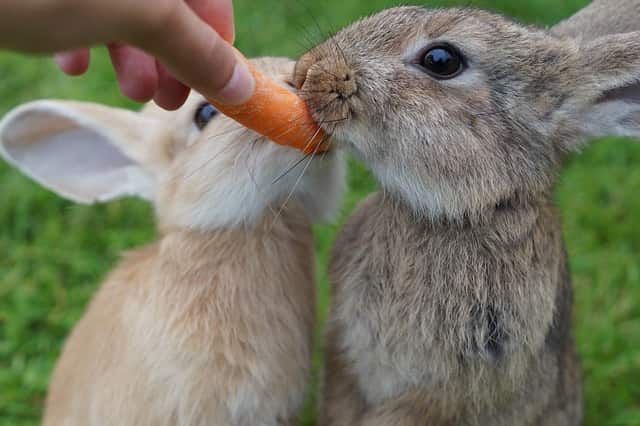
Leafy green vegetables should take up approximately 75% of a bunny’s diet. Deciding which leafy greens can be tricky as some plants can be toxic to your bunny while others should only be fed sparingly because of their nutritional content.
There are also non-leafy greens that can be tasty additions to your bunny’s salad that provide extra essential vitamins and minerals for overall health. It’s important to know which are safe for your bunny to eat.
Can My Bunny Eat Lettuce?
Bunnies love lettuce and certain kinds of lettuce are safe for them to eat. Iceberg is a lettuce you should avoid feeding to your bunny because of its high lactucarium and calcium levels compared to other lettuces which can make your bunny sick.
If you’re wondering what kind of lettuce you can feed your bunny, then here is a list. Generally, the darker the leaf, the better the lettuce.
- Butterhead
- Cos
- Frisee
- Green leaf
- Red leaf
- Romaine
- Lollo rosso
- Lollo
Lettuce contains many health benefits from its vast array of vitamins and minerals.
- Low calorie
- High water content
- Low protein – Low protein count which is great for reducing the risk of urinary sludge.
- Fiber
- Calcium – lower than most leafy greens.
- Phosphorus
- Potassium & Magnesium
- Vitamin A
- Vitamin K
- Folate
Lettuce can be fed as your bunny’s staple leafy green vegetable as it is cheap and healthy. Opt for the darker leaves as they are more nutritious and avoid iceberg lettuce at all costs.
It is recommended to feed your bunny 2 cups of vegetables per 6 lbs of body weight each day. We like to turn that into two separate meals for our bunny. 1 cup of lettuce and some herbs in the morning and the same in the evening along with her pellets.
Lettuce is also very low in oxalates and calcium making it safe for your bunny to consume a lot of it with less risk of developing urinary stones [6].
Can My Bunny Eat Cucumber?
Cucumber is safe for your bunny to eat. However, it shouldn’t be fed at the quantities of leafy green vegetables. Rather, a few slices will suffice in addition to their leafy greens as over consumption can lead to stomach problems.
Cucumber has a very high water content making it a great low-calorie snack. However, because of its high water density, it is relatively void of nutrients making it more of an “every now and then” snack. They contain a small amount of:
- Fiber
- Vitamin A
- Vitamin C
- Calcium
Even with these nutrients in minute quantities, there isn’t much else. Feed cucumber to your bunny sparingly as there are better vegetable options for your bunny’s health. If your bunny is not drinking enough water or it is a very hot day, then adding cucumber to their salad may be a good option to increase their fluid intake.
Can My Bunny Eat Peppers?
Your bunny can eat peppers of all colors [4]. Because of their color, they are a great source of antioxidants along with vitamins and minerals and are high in fiber. Peppers should not make up the majority of a bunnies vegetable intake. Rather, they should be used as an extra vegetable for variety along with their leafy greens.
Peppers are filled with various vitamins and minerals to keep your bunny healthy.
- Fiber
- Vitamin A, C, and B6, E, and K
- Antioxidants (carotenoids)
- Folate
- Potassium
- Manganese
When feeding bell peppers to your bunny, be sure to remove the seeds and core as the core isn’t edible and may cause blockages. Seeds of the pepper aren’t worth the risk to your bunny’s digestive tract and teeth.
Can My Bunny Eat Bok Choy?
Bunnies can eat Bok Choy all the way from the root to the leaf leaving nothing to waste [5]. While Bok Choy is generally highly recommended for bunnies, be aware of their moderate calcium level which could increase the risk urinary sludge if eaten too often.
While Bok Choy has moderate calcium levels, their oxalate level is low making them a great leafy green vegetable option for some variety. They are packed with many essential vitamins and minerals.
- Vitamin A, C, B6, and K
- Magnesium
- Calcium
Bok Choy provides a very large amount of Vitamin A so it is well worth feeding it to your bunny.
Can My Bunny Eat Spinach?
Spinach is safe for bunnies to eat and will likely enjoy it. However, they have a very high oxalate content meaning when fed in excess (generally no more than twice a week), the risk of developing urinary stones will increase [6]. Spinach is a great source of potassium and folate to keep your bunny’s immune system strong.
The easiest way to feed your bunny spinach is to add a few leaves on top of your bunny salad. That way, the quantity you feed is low but your bunny still gets the benefit of the vitamins and minerals in the leaf.
- Potassium
- Zinc
- Magnesium
- Folate
- Vitamin A, B6, C, and K
Can My Bunny Eat Broccoli?
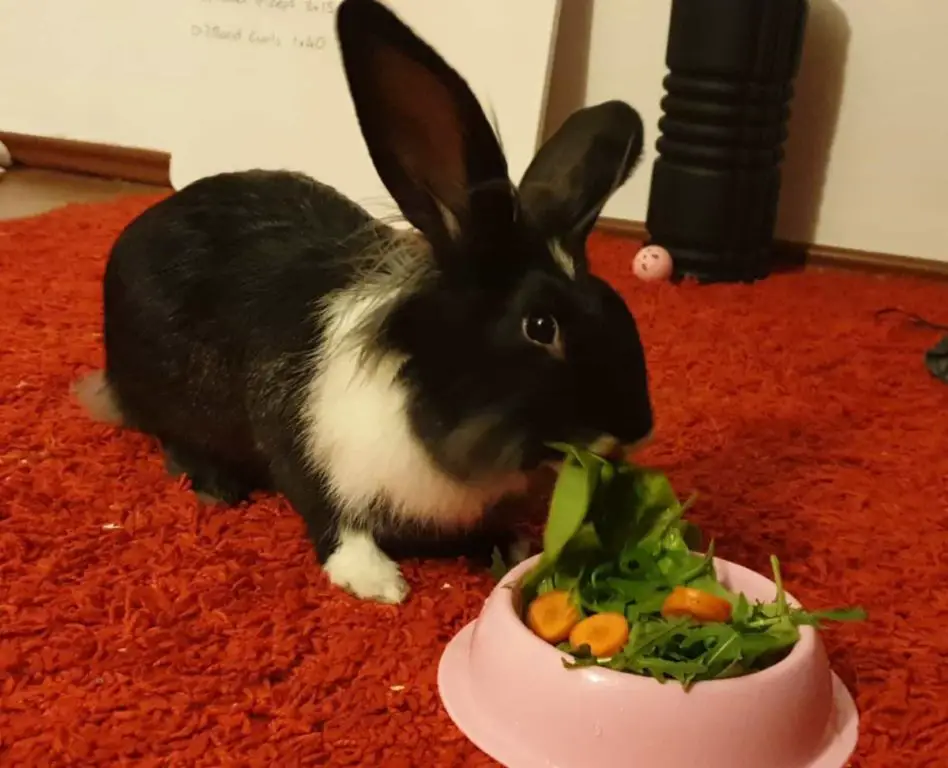
Broccoli is safe to eat (with a caveat) for your bunny but shouldn’t replace their leafy greens. Broccoli has a high calcium and protein content meaning it can increase the risk of urinary sludge if fed in excess [7]. Caution should be taken as broccoli can give your bunny painful gas. Start in very small quantities or not at all [8].
Feeding broccoli as a side dish to your bunny’s leafy greens should be fed sparingly. It should not replace the 2 cups per 6 lbs bodyweight of leafy greens bunnies need each day. Broccoli has a host of vitamins and minerals beneficial for your bunny like phosphorus for bone health.
- Vitamin A, B6, C, E, K
- Folate
- Magnesium
- Phosphorus
- Potassium
- Manganese
While broccoli has such a high calcium concentration and can potentially cause gas, it may be better to steer clear altogether.
Can My Bunny Eat Kale?
Kale falls under the same umbrella as spinach. It is safe for bunnies to eat but should be fed very sparingly because of its high oxalate and calcium content [8]. The high vitamin content of kale may make it worthwhile feeding to your bunny in small quantities once a week.
- Vitamin A, B6, C, K
- Manganese
- Potassium
- Magnesium
- Antioxidants (beta-carotene)
Can My Bunny Eat Celery?
Celery is a great source of vitamins and minerals for bunnies and is safe for them to eat. It should be fed in small quantities as to not replace their leafy green vegetable intake. Celery must be cut into small pieces as long strings can cause digestive issues.
Celery is a vegetable that is very low in calories but unlike cucumber, is packed with vitamins and minerals as well as being high in fiber. They contain moderate levels of oxalates so feeding a thumb sized piece along with their leafy greens is more than enough. Here are some of the vital nutrients that your bunny gets from eating celery.
- Vitamin A, B, K
- Potassium
- Folate
- Magnesium
- Phosphorus
- Manganese
It’s important when feeding celery to cut the sticks up into smaller pieces. The long celery strings can be dangerous by either causing blockages in the stomach or getting stuck in your bunny’s teeth potentially causing infection.
If you like to eat celery yourself, you likely through the leaves away. However, these can make perfect snacks for your bunny so you don’t waste any of the celery plant. The leaves have a lower water and calorie content and don’t have the risk of ingesting long celery strings.
Can My Bunny Eat Zucchini?
Bunnies can eat zucchini, the skin, leaves, and the flowers. In fact, any vegetable in the squash family is safe for your bunny to eat. Zucchini has plenty of essential vitamins and minerals and is low in calories. An added bonus is that zucchini contains antioxidants to help fight free radicals.
Zucchini has a low oxalate and calcium content making it a great vegetable to feed regularly alongside your bunny’s leafy greens. Plenty of vitamins and minerals in Zucchini make it a healthy choice.
- Magnesium
- Phosphorus
- Potassium
- Vitamin A, C, K
- Folate
- Antioxidants (carotenoids)
- Fiber
Zucchini should not replace your bunny’s leafy greens. You should feed it raw and you can leave the skin on so your bunny gets extra fiber. Providing a great source of antioxidants, Zucchini has potential cancer-fighting properties.
Can My Bunny Eat Tomatoes?
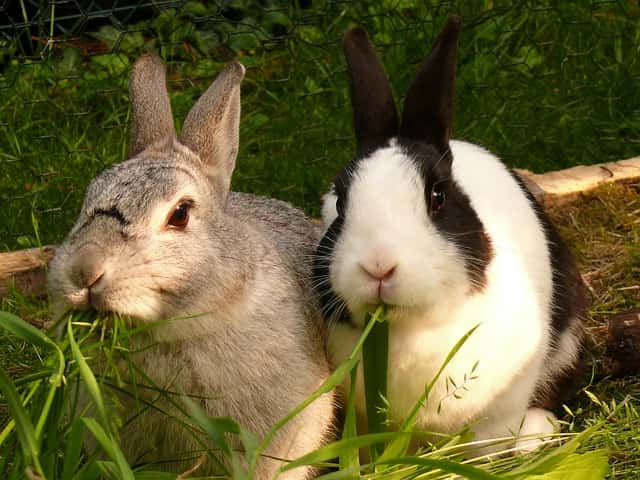
Tomatoes are safe for your bunny to eat but should be only be fed every so often as a treat. They have moderate levels of oxalates but are high in vitamin A and the antioxidant lycopene. The seeds should be removed from the tomato as they can pose a health risk to your bunny.
Any type of tomato can be fed to your bunny. They have a high water content to help keep your bunny hydrated during warm weather and a low overall calorie content.
Tomatoes should be fed sparingly in small quantities as there are better options as a side dish to your bunny’s leafy greens. Here is a snapshot of some of the beneficial vitamins and minerals present in tomatoes.
- Vitamin A, B, C
- Potassium
- Antioxidants (lycopene)
- Fiber
- Potassium
It’s important to never feed your bunny the tomato plant or leaves. The plant itself is toxic to bunnies while the tomato isn’t. Be sure to remove the stalk from the tomato first before feeding and cut it into small pieces. Remove the seeds as seeds can cause digestive problems as they aren’t broken down in the gut.
Lycopene helps prevent cell damage and may play an important role in preventing heart disease in bunnies [11,12].
Can My Bunny Eat Cauliflower?
Like broccoli, cauliflower can cause gastric distress and bloating for your bunny [13]. It is also high in oxalates so feeding cauliflower should be done sparingly. However, cauliflower is a great source of Vitamin B6.
Your bunny can also eat the cauliflower greens so none of your vegetable has to go to waste. Again, these should be fed sparingly and in small quantities. It contains a plethora of vitamins and minerals for bunny health.
- Vitamin B6 and K
- Folate
- Magnesium
- Phosphorus
- Potassium
- Manganese
- Fiber
Cauliflower does have a very high Vitamin C content. This could turn your bunny’s urine to a reddish color so don’t be alarmed if you see this after feeding cauliflower [8].
Can My Bunny Eat Cabbage?
Cabbage is safe for your bunny to eat and is packed with essential vitamins and minerals for your bunny. Caution must be taken when feeding cabbage as it may cause bloating similar to broccoli and cauliflower. This means it should be fed in small quantities and sparingly unless you know your bunny is okay with it.
Cabbage is low in oxalates and have a moderate calcium content as well as being high in fiber making it a great vegetable to feed your bunny if they don’t get bloated or gassy. Additionally, there are plenty of essential vitamins and minerals.
- Fiber
- Vitamin A & K
- Folate
- Magnesium
- Phosphorus
- Potassium
- Manganese
- Calcium
Feeding cabbage could lead to diarrhea because of the potential bloating. That is why it must be introduced in small quantities. If it does cause diarrhea, then you can eliminate cabbage from their diet.
Both varieties of green and red cabbage can be fed to your bunny. Red cabbage can turn your bunny’s urine green so don’t be alarmed if you notice this after feeding red cabbage.
Can My Bunny Eat Onions?
Ingesting onions can cause an anaphylactic response and also has an immunosuppressive effect when fed to bunnies [14]. For this reason, onions should be avoided in a bunny’s diet under all circumstances.
Eating onions can also cause hemolysis which destroys red blood cells which can potentially cause dizziness and confusion. Onions are part of the Allium plant family which also includes garlic and some herbs such as chives. All of these are toxic to your bunny and should not be fed. This includes any onion variation such as greed and red onions.
Can My Bunny Eat Carrots?
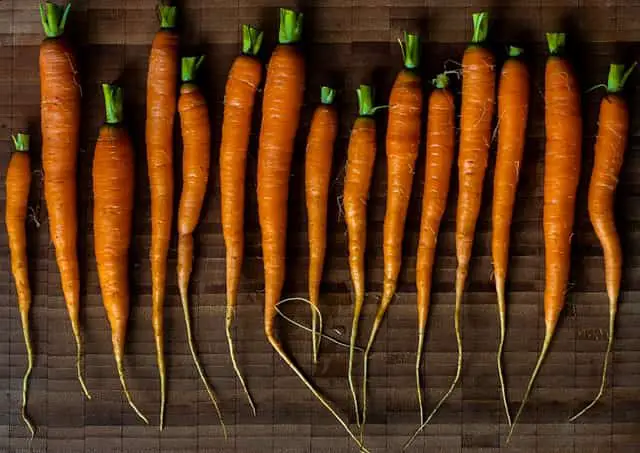
If your bunny ate carrots at the rate Bugs Bunny does, your bunny would probably be overweight. Carrots have a high sugar content making them treats more than regular vegetables to be fed. They are safe for your bunny to eat but as occasional treats and are rich in Vitamin A which is great for your bunny’s development.
The carrot tops can also be fed and the leafy greens can be part of the treat. Opt for carrots as a treat instead of store-bought packaged treats. Carrots have some of the highest Vitamin A content out of any vegetable so your bunny can still benefit from their tasty treats.
- Vitamin A, B6, E, K
- Magnesium
- Phosphorus
- Fiber
- Potassium
- Manganese
Can My Bunny Eat Avocado?
A toxin called persin which is found in avocado is highly toxic to bunnies. When avocado is ingested by bunnies, this toxin can cause breathing troubles and even death [13]. For this reason, avocado should not be in any part of a bunny’s diet.
Other than avocado being highly toxic to bunnies, they are also high in fat and carbohydrates meaning if they were safe to feed to your bunny, regular ingestion would likely lead to becoming overweight.
What Herbs Can Your Bunny Eat?
Bunnies generally love herbs as they provide intense flavor to their ordinary leafy greens. They are cheap and only need to be topped as a garnish. Herbs can even provide extra nutrients and bunnies absolutely love them.
Can My Bunny Eat Thyme?
Thyme is a safe herb for your bunny to eat. Anecdotal evidence suggests that thyme can potentially be used as a treatment for diarrhoea in bunnies. It is loaded with vitamins and minerals making it a great topping on leafy greens.
If your bunny is suffering from diarrhoea, consult your vet rather than trying to just treat with thyme. Surprisingly, Thyme is very high in Vitamin A and C. It contains many other vitamins and minerals as well.
- Vitamin A, B6, C, and K
- Magnesium
- Calcium
- Phosphorus
- Manganese
- Folate
- Iron
Can My Bunny Eat Parsley?
Parsley is a tasty, safe to eat herb for your bunny [15]. Bunnies can even eat the stem so none of the herb will go to waste. It is rich in Vitamin A and K so topping your bunnies leafy greens or even feeding the stems and leaves as a treat are both good options.
Our bunny loves parsley and we often use it as a topping of her leafy greens and we add the stems as well for extra fiber. Parsley is also very high in folate and iron and contains a plethora of other vitamins and minerals.
- Vitamin A, B6, K
- Folate
- Iron
- Calcium
- Magnesium
- Phosphorus
- Potassium
- Manganese
- Zinc
- Fiber
Can My Bunny Eat Cilantro?
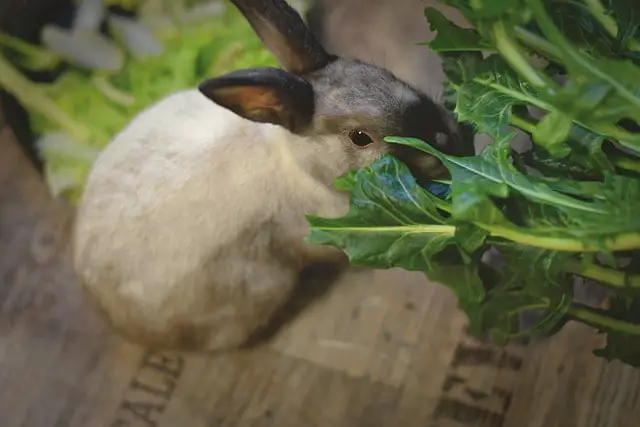
Cilantro is safe for you bunny to eat and will add extra flavor to your bunny’s salad. They can eat the leaves and the stem so none will go to waste. Cilantro contains important vitamins and minerals such as Vitamin A and K, and may even improve digestion.
Cilantro has other health benefits such as preventing UTIs and reducing gas making it a great garnish on their salad [17].
- Vitamin A, C, K
- Folate
- Potassium
- Manganese
- Magnesium
- Phosphorus
- Calcium
What Fruit Can My Bunny Eat?
Fruit must be fed in moderation. While we as humans eat fruit for its health benefits and taste, bunnies are much smaller so the small amount of sugars in fruit a relatively large amount in bunnies. Consuming too much sugar from fruit may cause your bunny to become overweight and have health issues that come along with it.
Not all fruit can be fed to a bunny. Some are toxic and some are much better for them than others. Find out the answers to your common fruit questions below!
Can My Bunny Eat Grapes?
Bunnies love grapes. They are safe to eat but should be fed sparingly as treats. One to two grapes for a serving is more than enough. Your bunny can also eat the grape stems that are attached as they will taste like sweet sticks.
Grapes are loaded with healthy vitamins and minerals but are also high in sugar. Feeding grapes too often can lead to becoming overweight. The benefits of grapes make them an enticing treat to feed to your bunny.
- Vitamin B6, C, K
- Manganese
- Potassium
- Antioxidants
- Fiber
- Phytochemicals (resveratrol)
The phytochemical resveratrol helps protect against chronic diseases. The antioxidants lutein and zeaxanthin help to maintain healthy eyesight. If you’re looking for a fruit treat for your bunny, make sure grapes are on the menu.
Can My Bunny Eat Strawberries?
Strawberries are safe for bunnies to eat and they will love this sweet morsel. You can feed one to two as a treat either diced up or whole. You can leave the green stem for your bunny to eat too.
Strawberries are rich in Vitamin C, but since bunnies can produce their own Vitamin C from glucose, this isn’t as important. However, strawberries contain high levels of the antioxidant anthocyanin to help prevent heart disease. They also contain very high levels of manganese which is great for bone growth and digestion.
- Vitamin B6, C, E, K
- Folate
- Calcium
- Magnesium
- Phosphorus
- Potassium
- Manganese
- Fiber
Can My Bunny Eat Raspberries?
Bunnies love raspberries and you’ll see their cute little mouths go bright red after eating them. Raspberries are safe for your bunny to eat and contain plenty of Vitamin C, K and a lot of manganese for bone growth and digestion.
Raspberries, like other fruit, should be fed in very small quantities. One to two raspberries every few days is more than enough to treat your bunny. The high sugar content can become problematic if fed very regularly. Raspberries make great treats because of their micronutrient content and cancer fighting antioxidants.
- Fiber
- Vitamin C, E, K
- Folate
- Calcium
- Magnesium
- Phosphorus
- Potassium
- Manganese
- Antioxidants
Your bunny can also eat the raspberry leaves if they enjoy the taste.
Can My Bunny Eat Blueberries?
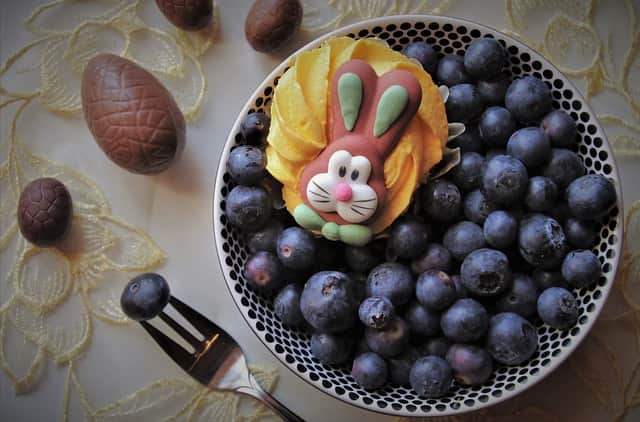
Blueberries make a great healthy treat that are full of health benefits such as cancer-fighting phytochemicals, and vitamins and minerals to support optimal health. Like other berries, they should be fed sparingly because of their high sugar content.
One to two blueberries as a treat is more than enough to spoil your bunny. However, this shouldn’t be fed every day and instead only a few times a week maximum. Blueberries can add more variety to your bunny’s diet.
- Manganese
- Vitamin B6, C, E, K
- Phytochemicals
- Antioxidants
- Folate
- Potassium
- Magnesium
- Phosphorus
The phytochemical resveratrol helps protect against chronic diseases while antioxidants anthocyanin, myricetin, and quercetin help prevent heart disease and cancers.
Can My Bunny Eat Apples?
Our bunny will go crazy over some apple. It’s safe to eat and contains lots of fiber especially if you leave the skin on. It’s important to not feed the apple seeds as they are toxic for a bunny. Instead, cut small pieces of apple that your bunny can nibble on.
The apple seeds and stems are toxic for bunnies. They contain a poisonous compound that can trigger dangerous symptoms that will upset your bunny’s health such as stomach pain, diarrhea, and respiratory congestion.
Cutting the apple up will remove all of these potential problems. Be sure to only feed one to two slices a week as a treat due to the sugar content. It is well worth feeding because of the vast array of vitamins and minerals present in apples. Green or red apples, any of them will make great treats.
- Fiber
- Vitamin B6, C, K
- Magnesium
- Potassium
- Manganese
Can My Bunny Eat Oranges?
Oranges make a healthy, digestive treat for bunnies. They contain a source of fiber called pectin which acts as a “laxative” to clear the intestines and also reduces blood cholesterol. However, they should not be fed regularly as your bunny may suffer from mouth ulcers and stomach problems from the acidity [18].
For senior bunny’s that have slightly sludgy urine, oranges may be a way to combat this and help prevent urinary tract and kidney infections.
You don’t have to use the actual orange as a treat for your bunny. Instead, you can eat the orange and you can provide some of the orange peel as a treat. It is higher in fiber and contains plenty of flavonoids and cholesterol reducing properties [19].
- Calcium
- Folate
- Vitamin A, C, E
- Magnesium
- Phosphorus
- Potassium
- Manganese
Can My Bunny Eat Watermelon?
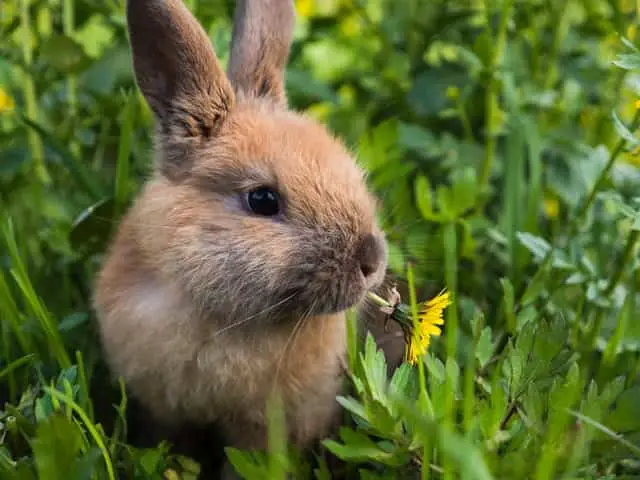
Watermelon makes a great bunny treat on hot summer days. They have a high water content to help hydrate your bunny. However, they have a high sugar and a low fiber content which means watermelon should be fed sparingly.
If you’re feeding watermelon to your bunny, be sure to remove the seeds as they can potentially cause blockages in your bunny’s digestive tract. One to two servings a week is more than enough of about a Rubik’s cube size. Excessive consumption can potentially lead to diarrhoea because of the high water content.
- Vitamin A, B6, C
- Magnesium
- Phosphorus
- Potassium
- Manganese
Can My Bunny Eat Bananas?
Bananas are a real treat food for bunnies. They are very high in sugar so should be fed sparingly or as a way to help get other food or medicine down if your bunny isn’t eating much (e.g. after surgery). Watch for diarrhoea or an upset stomach after feeding banana and eliminate it if there issues.
Our bunny loves the banana skins. We sometimes give her a small piece of the fibrous skin to eat or she’ll come chase after the one we are eating. This shouldn’t be regularly as even the skins are high in sugar. Bananas are very high in Vitamin B6 which can help with immune function.
- Vitamin A, B6, C, E, K
- Folate
- Magnesium
- Potassium
- Manganese
Can My Bunny Eat Pineapple?
While pineapple is safe for bunnies to consume, it is very high in sugar so it should be fed in very small quantities. The skin of the pineapple should be removed and only the flesh should be eaten by your bunny.
Pineapple also contains an enzyme called bromelain which can help bunnies that are dealing with diarrhea and potentially help with hairballs. Only feed fresh pineapple as a treat to your bunny and not canned as canned pineapple is much higher in sugar due to sitting in syrup and having other preservatives.
- Vitamin A, B6, C, K
- Folate
- Calcium
- Magnesium
- Potassium
- Manganese
Can My Bunny Eat Pears?
Pears are safe for your bunny to eat but should be fed similarly to apples by cutting into small slices and removing the seeds. One to two small slices as a treat is enough at one time and should be fed only a few times a week. Keep the skin on for extra fiber and even the twig can be fed.
Pears don’t have such high levels of micronutrients compared to other fruit. However, they make this up with fiber and a relatively high Vitamin K level.
- Vitamin A, B6, C, E, K
- Folate
- Magnesium
- Phosphorus
- Potassium
- Manganese
Can My Bunny Eat Cherries?
Cherries are safe for your bunny to eat but never feed the cherry pit, twigs or other parts of the cherry tree as they are poisonous. One to two cherries is a suitable serving as a treat once a week.
Cherries should only be fed as a treat for your bunny if they are fresh. Dried cherries have three times the sugar content so they are a no go. However, cherries are a great source of potassium and manganese, phosphorus, and magnesium.
- Vitamin A, B6, C, K
- Magnesium
- Phosphorus
- Potassium
- Manganese
Can Your Bunny Eat Other Human Food?
Sometimes your bunny may decide that because you can eat it, they can too! This is rarely the case and it’s often better to be selfish with your food than share it with your bunny.
Can My Bunny Eat Popcorn?
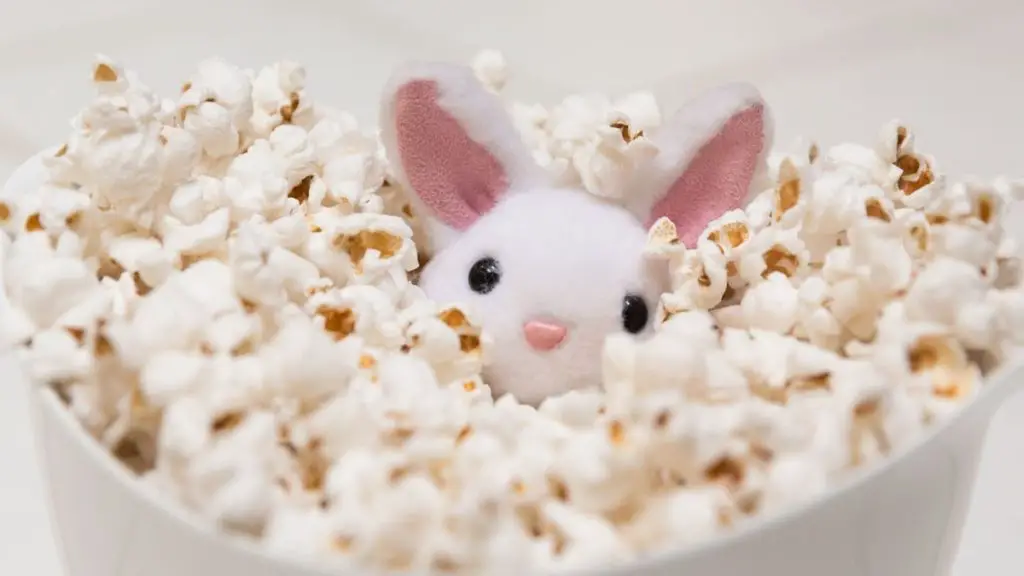
Generally, corn is a problem for bunnies as the corn kernel can cause blockages in the digestive system. Popcorn is generally safe to eat as the kernel has popped removing the tough hull. However, popcorn is typically covered in salt and oil making it an unhealthy treat for bunnies.
Un-popped corn kernels are composed of a complex polysaccharide that bunnies struggle to digest whereas plants are composed of easily digestible cellulose and pectin. While popcorn may be high in fiber, the extra carbohydrates and fat that come along with it make it a treat that shouldn’t be fed to your bunny.
Can My Bunny Eat Bread?
Bread is not safe for your bunny to eat. While they may enjoy it, their stomachs can’t handle it. Bunnies struggle to digest starch and complex carbohydrates found in bread as their digestive systems are designed to digest plant matter.
It is a good idea to avoid any foods that are wheat-based because of these complex carbohydrates.
Can My Bunny Eat Potatoes?
Potatoes aren’t necessarily dangerous for your bunny to eat but potatoes provide a lot of starchy carbohydrates which is not ideal for a bunny. A bunny needs high fiber, low starchy carbohydrate foods like hay for their digestive system to work properly.
Whether you have raw, cooked, boiled, peeled, or fried potatoes, none of them should be fed to your bunny as potatoes can cause digestive problems. Fruits make better sweet treats because of their micronutrient content.
Can My Bunny Eat Chocolate?
Just like with dogs, chocolate is poisonous for bunnies [13]. It contains theobromine and caffeine which upregulates a bunny’s nervous system and causes potential dehydration. Chocolate may also cause seizures by increasing calcium levels in the heart and muscles [19].
1 oz of chocolate can be deadly to a 6-pound bunny. Make sure you keep chocolate out of reach as they can quickly get into anything lying around. It doesn’t matter what kind of chocolate, a bunny can’t eat it. Especially dark chocolate which as three times the amount of theobromine compared to milk chocolate.
If your bunny eats chocolate, get them to a vet straight away. It may take 6-12 hours for symptoms to develop so don’t assume your bunny is okay.
Can My Bunny Eat Rice?
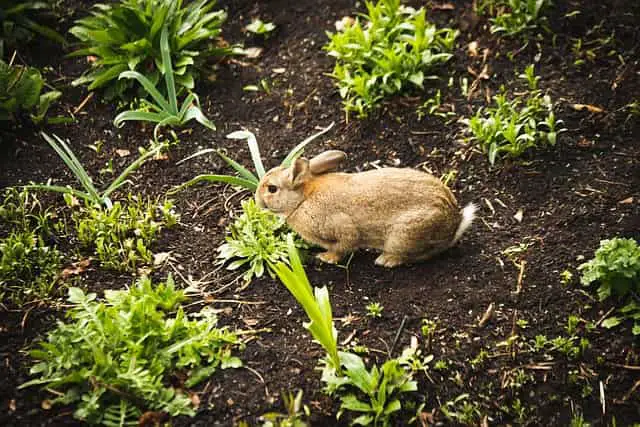
Like other grains, rice shouldn’t be fed to your bunny. Rice can cause digestive problems in your bunny and the excess carbohydrates can breathing problems, dizziness, and decreased appetite. Rice was very little fiber and is void of other nutrients making it a no go for bunnies.
If your bunny ingests rice and shows symptoms such as decreased appetite, less activity, and generally looking in discomfort, then get your bunny checked by the vet ASAP. In the meantime, try to feed them as much hay as possible to keep their digestive system working.
Can My Bunny Eat Nuts?
Nuts are considered safe for bunnies to eat but are not recommended. They are very high in fat and carbohydrates making them easy to overfeed and gain weight. Further, a bunny’s digestive system isn’t designed to digest high-fat foods meaning nuts can cause digestive problems.
It doesn’t matter the kind of nut, all nuts should generally be avoided because of their high fat and calorie content. A high-fat diet for bunnies can lead to large artery dysfunction [20].
Can My Bunny Eat Seeds?
Generally, all types of seeds should be avoided with your bunny’s diet. While not all are toxic, seeds can cause blockages in their digestive tract. Seeds like sunflower and pumpkin seeds are very high in fat. So just like nuts, they are not designed for your bunny’s digestive system.
Rather, use fruit options for treats instead of seeds and nuts.





